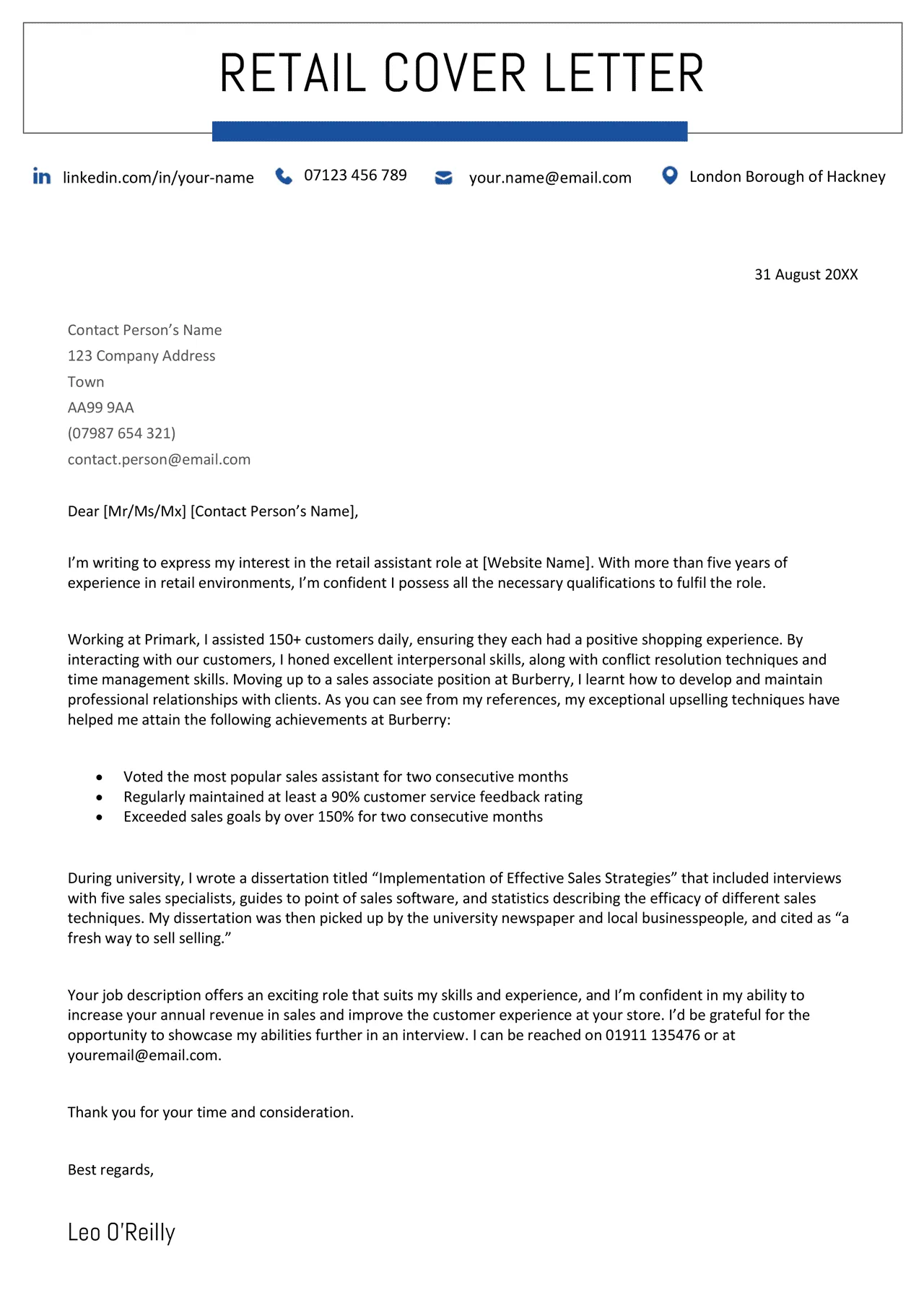Why a Retail Cover Letter Matters
In the competitive world of retail, a well-crafted cover letter is your first opportunity to make a lasting impression on potential employers. It’s not just a formality; it’s a crucial tool that can significantly increase your chances of landing an interview and ultimately, securing the job. A cover letter allows you to go beyond the confines of your resume and showcase your personality, enthusiasm, and specific skills that align with the requirements of the position. It gives you the space to explain your interest in the company and the role, highlighting your passion for the retail industry and your understanding of its dynamics. A compelling cover letter immediately sets you apart from other candidates, demonstrating your genuine interest and proactive approach. Therefore, a well-written retail cover letter can transform your application from ordinary to extraordinary, providing that essential edge in the job market. Consider it your personal introduction, a way to connect with the hiring manager and persuade them that you’re the ideal candidate.
Understanding the Retail Industry
Before you start writing your cover letter, it’s important to have a solid understanding of the retail industry. Retail is a dynamic sector that involves the sale of goods and services directly to consumers. It encompasses a vast range of businesses, from clothing stores and supermarkets to electronics retailers and online marketplaces. To excel in retail, you need to grasp the core principles of customer service, sales strategies, inventory management, and visual merchandising. Understanding the current trends in the retail industry, such as the rise of e-commerce, the importance of personalized shopping experiences, and the increasing focus on sustainability, is also essential. This knowledge will enable you to tailor your cover letter to demonstrate your understanding of the industry and your ability to contribute effectively to the success of the company. Research the specific retail sector you’re applying to, learn about its competitors, and familiarize yourself with the company’s products, services, and target market.
Highlighting Relevant Skills and Experience

Your cover letter should be a showcase of your most relevant skills and experiences. While every retail job is different, there are several core competencies that employers consistently look for. Think of the job description as your guide and align your skills accordingly. The skills section is where you can connect your past experiences to the current role. It is a great chance to highlight specific achievements and responsibilities that directly relate to the job. Use action verbs to describe your accomplishments, quantify your results whenever possible, and focus on the impact you made in previous roles. For example, instead of saying ‘I assisted customers,’ you could write ‘Provided excellent customer service, resulting in a 15% increase in customer satisfaction scores.’ Always back up your claims with concrete examples to make your application more impactful.
Customer Service Excellence
Exceptional customer service is the cornerstone of success in the retail industry. Highlight your ability to create positive customer experiences by showcasing your communication skills, problem-solving abilities, and empathy. Describe how you’ve handled difficult customers, resolved complaints, and gone above and beyond to meet customer needs. Provide specific examples of how you built rapport with customers, provided personalized recommendations, and exceeded their expectations. Mention any customer service training or certifications you have, such as conflict resolution or active listening. Your goal is to demonstrate that you are genuinely committed to providing excellent service and building lasting relationships with customers. Remember, in retail, satisfied customers are repeat customers, and the ability to deliver outstanding service is a key differentiator.
Sales and Communication Prowess
Retail jobs often involve sales responsibilities, so your ability to sell effectively is a valuable asset. Demonstrate your sales skills by highlighting your experience in meeting sales targets, promoting products, and closing deals. Describe your communication skills, including your ability to explain product features, handle objections, and build trust with customers. Quantify your achievements by mentioning the sales figures you achieved, the percentage increase in sales you contributed to, or any sales awards you received. Highlight your experience in using point-of-sale (POS) systems and other sales-related technologies. Express your enthusiasm for selling products and helping customers find what they need. Show your ability to adapt your sales approach to different customer personalities and preferences and provide personalized recommendations that cater to their unique needs.
Attention to Detail and Organization
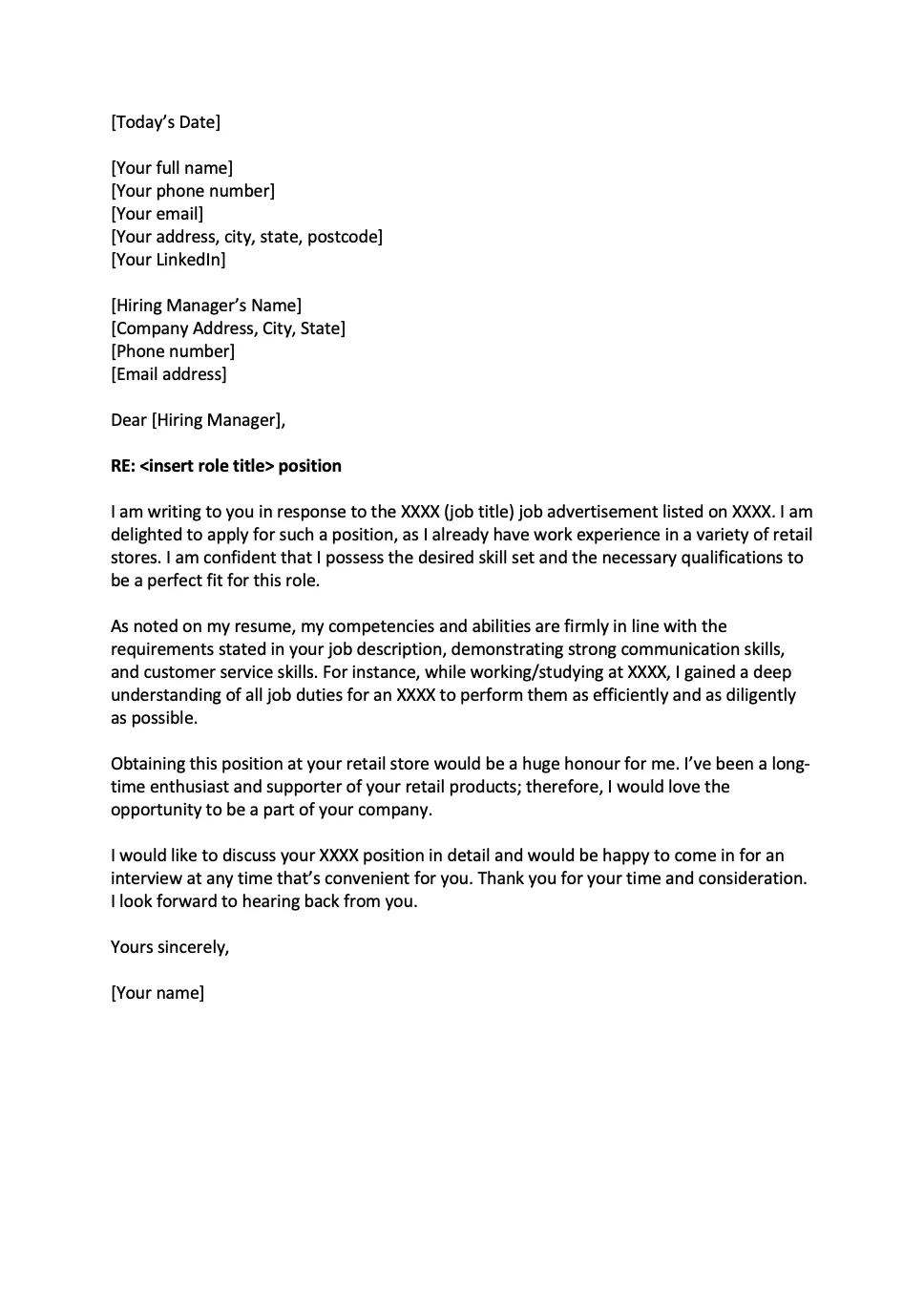
Retail environments require a high level of attention to detail and strong organizational skills. Demonstrate your ability to manage inventory, maintain store cleanliness, and handle transactions accurately. Describe your experience in processing payments, managing cash registers, and reconciling sales data. Mention any experience you have in visual merchandising, stock management, or loss prevention. Provide examples of how you ensured that products were displayed correctly, shelves were stocked, and the store environment was clean and inviting. Highlight any training or certifications you have related to inventory management or loss prevention. Your ability to maintain a well-organized and efficient work environment is crucial for success in the retail industry.
Tailoring Your Cover Letter for Retail Jobs
Generic cover letters simply won’t cut it. Customize your cover letter for each job application. Take the time to research the specific company and the role you’re applying for. Read the job description carefully and identify the key requirements and desired skills. Use the language and keywords from the job description throughout your cover letter. Demonstrate that you understand the company’s values, mission, and target market. Address the hiring manager by name, if possible, to show that you’ve taken the initiative to learn more about the company and its team. Tailoring your cover letter demonstrates your genuine interest in the specific role and your understanding of the company’s needs. This personalized approach will make your application stand out and increase your chances of getting noticed.
Researching the Company Culture
Before you start writing, conduct thorough research on the company. Visit their website, read their social media profiles, and look for any news or articles about them. Understanding the company’s values, mission, and culture will help you tailor your cover letter to align with their brand. Consider the company’s target market and tailor your tone and language accordingly. For example, if you are applying to a high-end fashion boutique, your tone should be professional and sophisticated. On the other hand, if you’re applying to a casual sportswear store, your tone can be more energetic and friendly. Demonstrating that you understand and appreciate the company’s culture will make your cover letter more persuasive.
Showcasing Your Personality
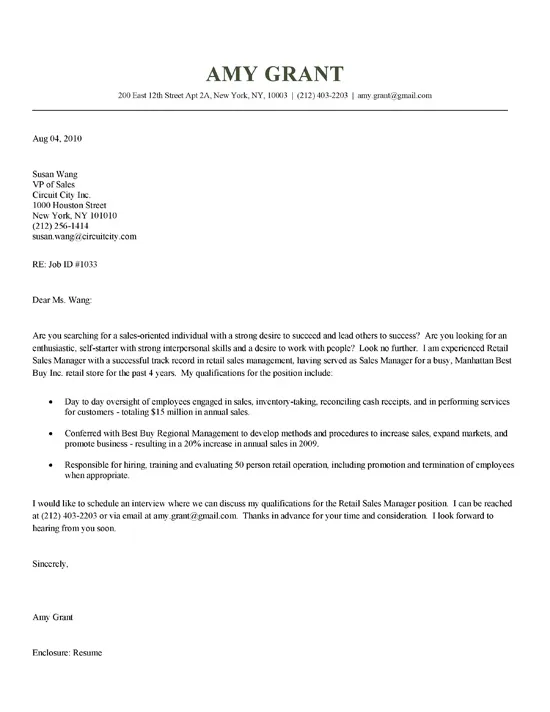
Retail is a people-oriented industry, and hiring managers want to see your personality shine through. While professionalism is important, don’t be afraid to let your enthusiasm and passion for the retail industry come through. Use a friendly and engaging tone, and avoid sounding robotic or overly formal. Share a brief anecdote that highlights your personality and demonstrates your customer service skills. This might be a story about how you resolved a customer complaint or went above and beyond to assist a customer. Show your genuine interest in the role and the company. This will make your cover letter more memorable and increase your chances of making a positive impression. Remember, employers are looking for team members who are not just skilled, but also personable and passionate about their work.
Structuring Your Retail Cover Letter
A well-structured cover letter is easy to read and helps the hiring manager quickly grasp the key information. Start with a clear and concise heading that includes your contact information and the date. Next, address the hiring manager by name, if possible. The body of your cover letter should be divided into three to four paragraphs. The opening paragraph should grab the reader’s attention and state the position you’re applying for. The middle paragraphs should highlight your relevant skills and experiences, providing specific examples to support your claims. The closing paragraph should summarize your interest in the role and express your enthusiasm for the opportunity. Remember to keep your cover letter concise and focused. Avoid using jargon or overly complex language, and proofread carefully for any errors. A well-structured cover letter leaves a professional impression and makes your application more effective.
Contact Information
At the top of your cover letter, include your full name, phone number, email address, and, optionally, your LinkedIn profile URL. Ensure your email address is professional and easy to read. Double-check that your contact information is accurate and up to date. Also, include the date and the hiring manager’s name and title, if you know it. This information ensures that the hiring manager can easily contact you if they want to learn more about your application.
The Opening Paragraph
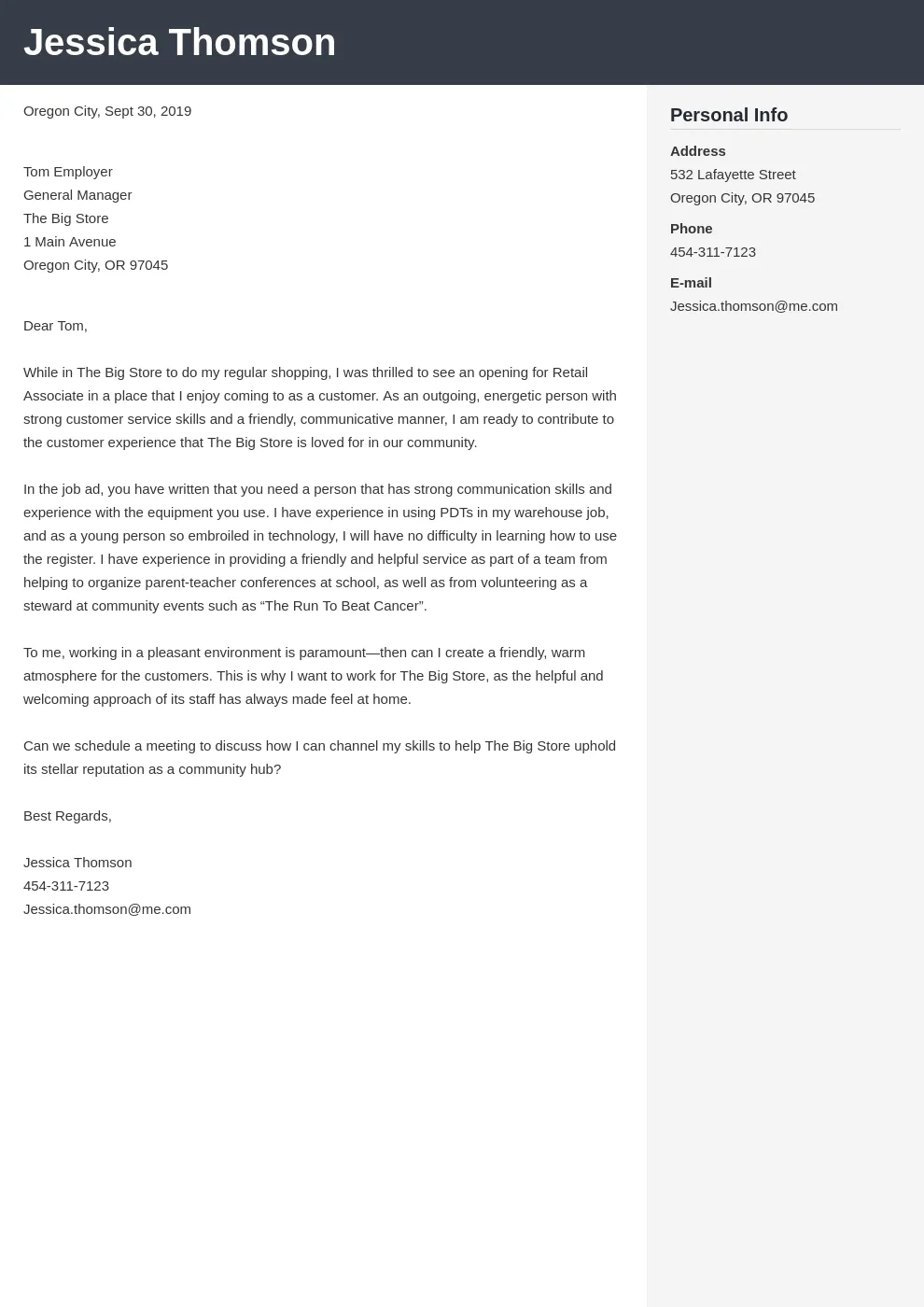
Your opening paragraph is your first opportunity to grab the hiring manager’s attention, so make it count. State the position you’re applying for and where you saw the job posting. Briefly explain why you’re interested in the role and the company. Highlight your key qualifications and skills that make you a strong candidate. Consider using a compelling opening statement that captures the reader’s interest and encourages them to continue reading. Keep the opening paragraph concise and focused. Aim to create a positive impression and set the stage for the rest of your cover letter. You want to immediately demonstrate your enthusiasm and highlight what makes you uniquely suited for the job.
Body Paragraphs Highlighting Achievements
The body paragraphs are where you showcase your skills and experiences in detail. Use these paragraphs to provide specific examples of your achievements and how you’ve demonstrated the key skills required for the job. Focus on quantifiable results whenever possible. Use action verbs to describe your accomplishments. Structure your paragraphs in a clear and organized manner. Link your past experiences to the job requirements outlined in the job description. Mention any relevant training, certifications, or awards you’ve received. Show the employer what makes you a strong candidate by highlighting your successful history and proven capabilities.
Closing the Letter and Call to Action
Your closing paragraph should summarize your interest in the role and reiterate your enthusiasm for the opportunity. Express your appreciation for the hiring manager’s time and consideration. Clearly state your availability for an interview and provide your contact information again. Include a strong call to action. Make sure to mention how you’re ready to discuss your qualifications and how you can contribute to the company’s success. End your cover letter with a professional closing, such as ‘Sincerely’ or ‘Best regards,’ followed by your name. A strong conclusion leaves a positive and lasting impression and increases the likelihood of getting a response.
Common Mistakes to Avoid in Retail Cover Letters
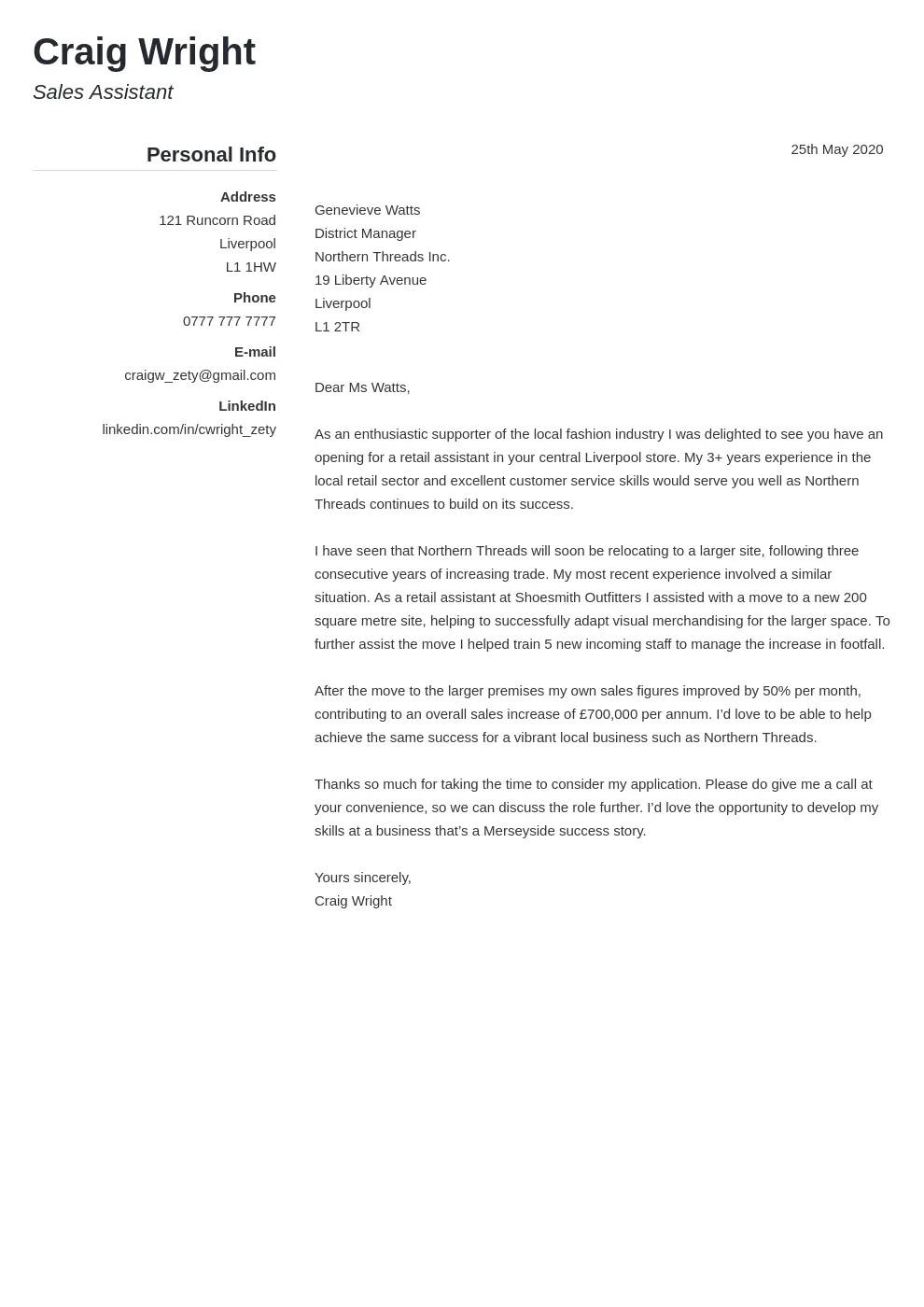
Avoiding common mistakes can significantly improve the effectiveness of your cover letter. Being aware of the pitfalls will help you create a more polished and persuasive application. By avoiding these errors, you can present yourself as a professional and detail-oriented candidate who understands the demands of the retail industry. Therefore, paying close attention to these elements will help you make a favorable impression.
Generic Language and Lack of Enthusiasm
One of the most common mistakes is using generic language and failing to demonstrate genuine enthusiasm. Avoid using generic phrases that could apply to any job. Show a real interest in the company and the role. Tailor your cover letter to the specific job description and demonstrate your understanding of the company’s values and mission. Highlight your passion for retail and your willingness to learn and contribute to the team. Expressing your enthusiasm will capture the reader’s attention and improve your chances of standing out in the crowd. Make sure your personality and eagerness to work are evident.
Typos and Grammatical Errors
Typos and grammatical errors can create a negative impression and undermine your credibility. Proofread your cover letter carefully before submitting it. Use a spell checker and grammar checker to catch any errors. Ask a friend or family member to review your cover letter for mistakes. Errors in spelling or grammar can make you appear careless and unprofessional. Make sure the language is clear, concise, and error-free. Take your time and ensure that your writing is polished. Proofreading is an essential step that can greatly enhance your application and showcase your attention to detail.
Ignoring the Job Description
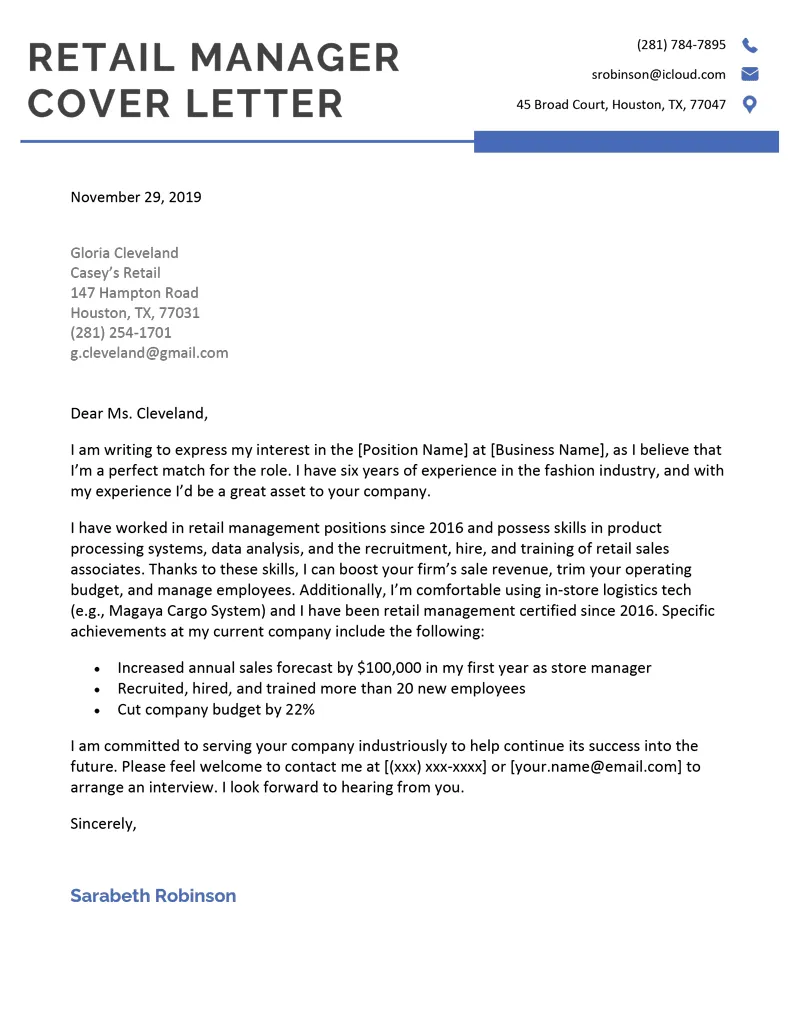
Failing to address the specific requirements outlined in the job description is another common mistake. Read the job description carefully and identify the key skills, qualifications, and experiences that the employer is seeking. Tailor your cover letter to highlight your relevant skills and how you meet the requirements of the job. Use the keywords from the job description to demonstrate that you understand the role and the company’s needs. Avoid generic language and instead, provide specific examples of how you’ve demonstrated the required skills in the past. By addressing the job description, you’ll show the employer that you’ve taken the time to understand the role.
Formatting and Presentation Tips
The formatting and presentation of your cover letter are just as important as the content. The layout should be easy to read and visually appealing. Choose a professional font, such as Times New Roman, Arial, or Calibri, and use a font size between 10 and 12 points. Use consistent formatting throughout your cover letter. Use clear headings and subheadings to organize your information. Maintain a consistent margin size and spacing. Make sure the letter looks balanced and not cluttered. A well-formatted cover letter shows professionalism and attention to detail.
Proofreading and Editing Your Cover Letter
Proofreading and editing your cover letter is crucial for ensuring that it is error-free and professional. Review your cover letter multiple times, checking for typos, grammatical errors, and inconsistencies. Pay close attention to the flow of your writing and ensure that your ideas are presented clearly and logically. Ask a friend or family member to read your cover letter and provide feedback. A fresh pair of eyes can often catch errors that you might have missed. If possible, read your cover letter aloud. This can help you identify awkward phrasing or grammatical errors. Proofreading and editing can significantly improve the quality of your cover letter and increase your chances of making a positive impression.
